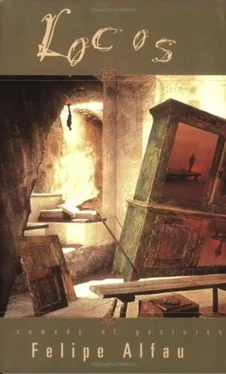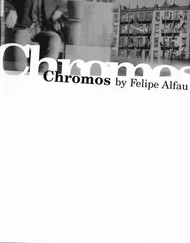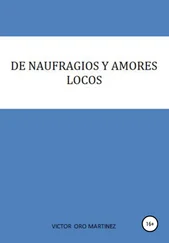Then I might make a character out of Lunarito, but I don’t want any more characters for the time being, they are too much trouble. Besides, Gaston himself has said that he wanted her to remain real and this is very significant.
It must be borne in mind that Gaston as a character is quite romantic at times, although he does not suspect it. Now, if a romantic human being had fallen in love with a vision, which is not likely to happen, according to romantic regulations he would want that vision to remain a vision, never to take shape, never to become plastic and human, because that would demolish his ideal. Well, a character is entirely the opposite of a real being, although it is sometimes our business to try to convince the reader to the contrary, and for him a vision is reality. That is why Gaston, as a character, wants Lunarito to remain real, because if she became fiction, she would enter and form part of the world to which he is used and his ideal would be destroyed. Therefore nothing will be done along that line and Lunarito will be left alone for the moment.
Strengthening the fictional side of Gaston, which is already beginning to weaken, remains to be done. He must be shoved back into his world of characters.
After that, if Gaston insists on becoming a real being in order to attain his ideal beyond the boundaries of his own world, I regret to admit that I shall not be able to help him. It is not in my power as a writer to create real beings, but only characters and that quite badly. Only his will to be, plus the mysterious and strange ways of life can help him. But I would not advise him to do that even if he were able. It would be assuming tremendous responsibilities, it would be a character who, because in a dream or perhaps a state of somnambulism, met a real person, became a human being and took upon himself the responsibility of conscious willful life, and all the unconscious actions of his past; who by becoming real lent all his actions a profound, serious meaning. All the things that once were nothing but play would then be real and truly affect his life and that of others. It would be a puppet who, by falling in love with a person in the audience, brought real life onto the stage, broke loose from all the threads which moved him and made a tragedy out of a comedy.
But now let me see how it happened that I met Gaston the character.
At the time I met him, he was generally known by the name El Cogote and that is the name I shall give to him for the time being.
I met El Cogote through Dr. José de los Rios, but before I met him I had already heard of this more or less notorious person.
El Cogote was known in Madrid as a prosperous chulo . Even more, he had graduated from that position into that one more respectable and profitable: an empresario . He owned one of the best amusement places in Madrid and was a rather influential personality in the gay world.
How El Cogote began and developed his career is a thing which I don’t know very well. From the contradictory opinions and comments of people who pride themselves on being his intimate friends, or who even ran an account at his place, I have confusedly gathered that he began as a protégé of a well-known café singer called La Pelos.
I remember seeing and hearing La Pelos in a café quite some time ago. She was a pompous-looking female with furiously black eyes, a very hoarse voice that smelled of chinchon a league away and a pronounced growth of hair upon her upper lip.
Even from the faint memory I have of her, La Pelos struck me as a woman of tempestuous passions and it is not strange that she should fall for El Cogote, at that time a thick-lipped languid-eyed youth (according to a picture of him I had seen in La Gaceta ). I have been told how their first meeting took place, although, as I have said, it is not to be considered authentic.
It seems that El Cogote (at that time he had not yet achieved this glorious name) was sitting alone at a table in the café where La Pelos sang. As she passed his table she bent over and said quite loudly:
“You need company, chiquillo . Are you willing to spend ten duros?”
And El Cogote had answered still louder:
“Certainly, have you got them?”
This answer made her laugh and won her. She sat by him and encircled his neck in her fat arm.
At that moment a stout, middle-aged gentleman with a large diamond ring and a gold watch chain, approached the table slowly, ominously. He was toying with a knife of fair proportions.
He tilted his cordobes forward over his right eye and regarded El Cogote squarely:
“It seems that you are filling in your own certificate of defunction.”
El Cogote swept the man with a sidelong glance. There was a cigarette hanging from his lips that shook beating time to his words as he said simply:
“I don’t think so.”
The two men looked at each other long and in silence. Then the gentleman with the diamond ring and the gold chain shook his shoulders, spat a wry smile and went away majestically. His bluff had been called, and incidentally, El Cogote had just introduced a new school.
After that day La Pelos belonged body and soul to El Cogote and for him she went to the dogs. According to the friend who told me the foregoing incident, El Cogote never cared for La Pelos and only used her as a good thing. She gave him an apartment, money, silk shirts, the most fashionable suits with short jackets and tight trousers, baggy at the bottom, and patent leather shoes with tan uppers. In her carriage she took him to all the verbenas and he always had at his disposal the best seats for every bullfight.
And even so he was always running after other women and treated La Pelos shamefully. She was a very jealous woman and their love affair was a stormy one. In many instances their fighting assumed such proportions and their behavior was so scandalous that the police had to interfere, but it is said that El Cogote had pull with the Prefect of Police and always got away without trouble.
However, his popularity had increased and with it his opportunities. He soon found more admirers and protectresses and his career progressed rapidly and brilliantly.
Then came a romantic incident in the life of El Cogote, which I have also gathered from various sources.
El Cogote had always been in love with a certain young lady in Madrid. A disgrace befell her family. Her father was accused of some crime and went to prison. Some people say that it was a frame-up. Others say that he was guilty. Just the same, the fact remains that he went to jail.
Some people in Spain take such disgraces entirely too seriously and often seek consolation in religion. However, whether that was the only reason, which does not seem likely, or whether there was some other motive, which the friend who told me suspects, Carmen — that was the young lady’s name — was sent to a convent in North Spain to be a nun.
They say that there a priest from a nearby convent fell in love with her and later committed suicide. This, according to my friend, is a fictional touch added by people’s imagination. But what he tells me as authentic is that El Cogote and Carmen, his sweetheart, could not console themselves for the separation imposed upon them by her family.
The result is that El Cogote visited the town where the convent was and one night the nun eloped with him. He took her back to Madrid with him as his mistress.
Apparently the reaction from her restricted past and the still more restricted environment of the convent, threw her to the other side of the balance. Under the demoralizing influence of her lover and a mad thirst for freedom, she led the most unbridled, licentious life. Soon after their arrival in Madrid, El Cogote, who during his trip to the North had accumulated a respectable amount of money from unknown sources, opened a luxurious amusement place in which the main attraction was the former nun.
Читать дальше












